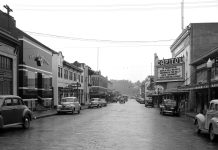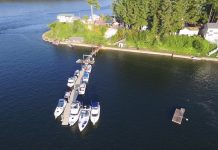The Dispute Resolution Center of Thurston County (DRC) involves a group of individuals dedicated to finding new ways to foster peace within the community with an emphasis on encouraging people to, as their website explains, “find positive ways through conflict.” Since 2010 DRC’s board of directors has been selecting a member of the community to receive the Evan Ferber Peacemaker Leadership Award,  which “recognizes an individual or individuals who have provided extraordinary leadership in promoting peaceful dispute resolution and/or service to our community.” The award is named after the founding executive director, Evan Ferber. This year the award is going to Glen Anderson, an active member of the Olympia Fellowship of Reconciliation (FOR), who has made it his life’s work to promote peace.
which “recognizes an individual or individuals who have provided extraordinary leadership in promoting peaceful dispute resolution and/or service to our community.” The award is named after the founding executive director, Evan Ferber. This year the award is going to Glen Anderson, an active member of the Olympia Fellowship of Reconciliation (FOR), who has made it his life’s work to promote peace.
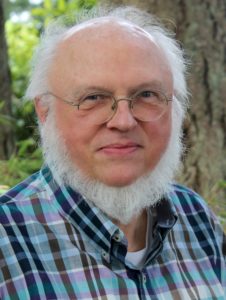
“Glen was chosen because he has truly ‘lived’ his mission to teach and promote non-violence,” says Sharon Fasnacht, a long-time DRC mediator and volunteer, who nominated Anderson for this award.
In addition to being a member of FOR, Anderson has been involved with the DRC since it began. “When Evan wanted to start a group back in the ‘70s, I helped put him in contact with other like-minded people,” he says. “So I’ve been involved with the DRC since the very beginning.” He believes their mission, peaceful conflict resolution, is an important one.
“I want to make sure the public knows we have this great resource [the DRC] in town,” Anderson explains. “I’m all about non-violence. If people can learn how to resolve disputes with as close to a win-win as you can get, it’s a non-violent solution.” In particular, he loves the programs they have in schools where kids are doing peer-mediation and learning to deal with conflict calmly and rationally.
Anderson Choose a Life of Peace Early
Anderson’s passion for peace started at a young age in his own home. He says that his parents were horribly mismatched and never got along. “It was a bad relationship, so even as a kid I thought there must be better ways to handle conflict than this,” he adds.
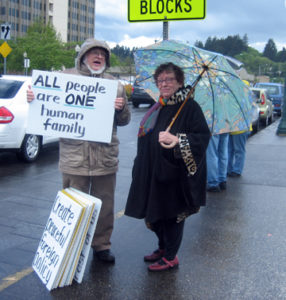
Furthering his belief were the teachings Anderson heard at the Lutheran church he grew up in. He says that the adherent message was, in fact, “quite radical, and the church didn’t understand how radical the message was.”
“What Jesus and the early church were doing and saying was ‘we live in a society where rich people are abusing poor people, and it’s not right,’” Anderson explains. “The modern church wasn’t paying attention to that. In Jesus’ time women, the disabled and foreigners were treated as lesser beings. He upended all of this and treated them equally – his message was ‘We are all one humanity. We have to appreciate each other and treat everyone fairly.’ It frustrated me that the church did not see that the inherent message was one of non-violence and profound social justice.”
Anderson says that the third and final thing that really pushed him to promote peace was the Vietnam War. “It was escalating and was so incredibly violent. The government was lying to us about its motivation for war, and it was just profoundly wrong in so many ways,” he explains.
Anderson was a conscientious objector based on his religious beliefs. In 1972, the draft board recognized his claim. It was that same year he became active with FOR. By 1976 he had started the Olympia Chapter. Within a couple years, the Olympia chapter became one of the most active in the United States.
Anderson’s Work
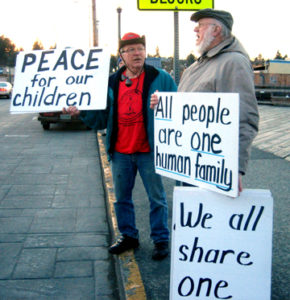
Photo credit: Lee Miller
It would take a book to write down all of the projects Anderson has been a part of or led over his lifetime. He writes a substantial, twenty page-plus, bi-monthly newsletter for the FOR, which includes a calendar of events and articles important to their peace movement. He is currently writing his 269th issue. In addition, he produces a TV program with over 350 episodes. When asked what his greatest accomplishment has been thus far, Anderson replied candidly.
“My work is long-term,” he explains. “We set small goals that lead to the bigger pictures. Sometimes we lose, sometimes we have small wins, but it’s never done.”
Some of Anderson’s main, ongoing projects include the dismantling of nuclear weapons, ensuring social equality for women, minority groups and the disabled, opposing military spending, opposing the death penalty, and pursuing environmental justice. His involvement includes writing papers, testifying to legislative committees, founding groups opposing these topics, and, of course, writing and developing his newsletters and TV programs.
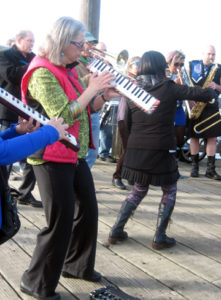
Anderson has also been involved in immigration rights in direct response to recent bans. He is, without fail, at the local FOR peace vigils. These take place every Wednesday from 12:00 p.m. to 1:00 p.m. at the NW corner of Sylvester Park (Legion and Capitol Way). He has been participating in this vigil since 1980. The groups other peace vigil happens every Friday from 4:30 p.m. to 6:00p.m. at Percival Landing’s south end (4th and Water).
Glen Anderson will be honored at DCR’s annual, invitation-only fundraising event, The Toast, on April 23. For more information on DRC or the Peacemaker Leadership Award, visit their website. Learn more about what FOR represents and how you can get involved by visiting their website.













